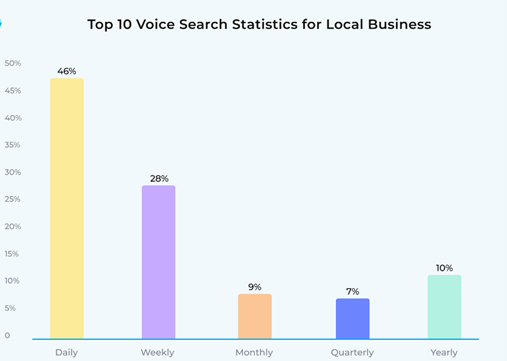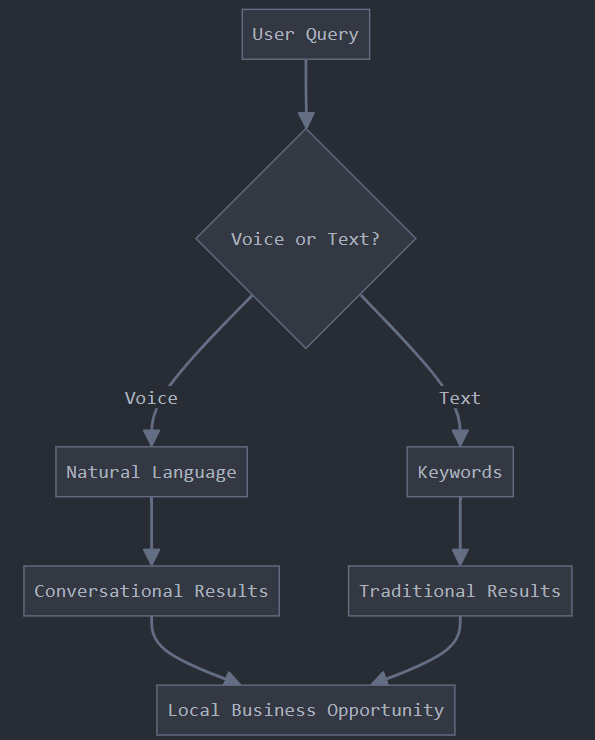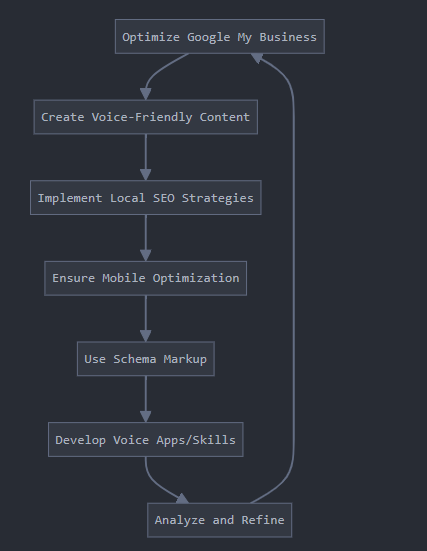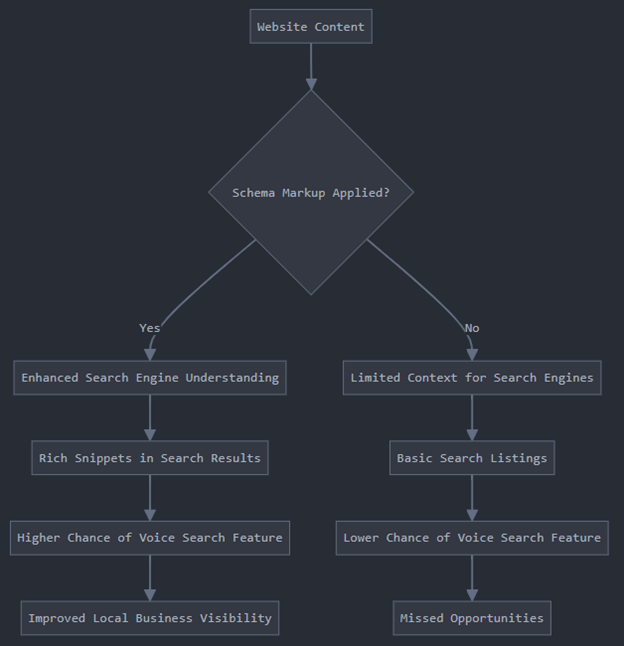Must Have Voice Search Optimization Strategies for Dominating Local Markets
Voice search optimization isn’t just a fad; it’s a fundamental need in how people interact with technology.
As smart speakers and voice-activated devices become global, local businesses must adapt or risk being left behind.
This guide about voice search tips for local businesses leads you through the ins and outs of optimizing your business.
The Shift from Typing to Talking
Voice Search Statistics That’ll Make You Listen Up
|
Year |
Voice Search Usage | Smart Speaker Ownership |
| 2020 | 50% | 39% |
| 2021 | 55% | 42% |
| 2022 | 60% | 46% |
| 2023 | 65% | 50% |
| 2024 | 70% (projected) | 55% (projected) |
The Local Business Advantage
Local businesses have a unique opportunity to capitalize on voice search. Why? Because many voice queries have local intent. People often use voice search to find nearby services, restaurants, or shops.
Pro Tip: Start small. Focus on optimizing for one or two voice assistants before expanding your efforts.
Voice Search Ranking Factors
Voice search ranking factors are not the same as those for traditional SEO, because people interact with voice search differently, in a more natural, conversational way. Here are some things that can influence rankings for voice searches specifically.
Featured Snippets (Position Zero)
When Google returns an answer box at the top of its results pages, voice search will often draw from this. You can increase the chances of being in position zero if you structure content to provide clear answers to specific questions.
Natural Language & Conversational Keywords
People tend to use longer, more conversational queries when speaking into their devices rather than typing them out. Using long-tail keywords and phrases that match the wording ordinary people would use conversationally will help search engines understand your content better when ranking it for voice searches.
Page Speed:
Fast-loading web pages have always been important; now they’re essential – especially for mobile voice search, which Google may well prefer fast-loading sites for if past form is anything to go by (three seconds or less).
Mobile Optimization
As most voice searches take place on mobile devices, it follows that mobile-friendly sites should rank highest. Make sure yours is easy to use on small screens and loads quickly; responsive design will help here, too.
Local SEO
A significant proportion of voice searches have local intent behind them: people looking for “plumbers near me,” etcetera. You can boost your chances of appearing in results related to these types of queries by claiming your Google My Business page, ensuring all information is up-to-date then incorporating relevant keywords throughout the site copy
Content Structure & Readability
Google prefers short sentences and paragraphs (around 20 words each), sub-headings every 300 words, and boolean bullet point lists where appropriate, among other elements, because such formatting makes the piece easy to read and skim even screen reader users.
Domain Authority Trustworthiness
Pages with higher domain authority rank better in Voice Search Results Pages (SERP). Remember, though, that being seen as an authoritative source on any subject doesn’t happen overnight – nor is it something that can be faked! You need lots of high-quality incoming links from relevant sites, plus content others find helpful enough to link back themselves, too.
Secure HTTPS Websites
If two pages are equal in every other respect, having HTTPS instead of HTTP will make a difference in rankings between voice searches and regular ones. Google has confirmed this itself; what’s more, data shows a strong correlation between URLs beginning with “https:” appearing on Page One SERP positions across a variety of industries.
Answering Questions Directly
Although not all voice searches are questions (therefore, this might not always apply), using a copywriting technique called bucket brigades, develop a content section where you answer common queries related to niche could help with ranking factors for these types of search results pages.
Optimizing Your Online Presence for Voice Search
The Foundation: Your Google My Business Listing
Your Google My Business (GMB) listing is the cornerstone of your local voice search strategy. Ensure it’s complete, accurate, and up-to-date.
GMB Optimization Checklist
- Verify your business
- Provide accurate NAP (Name, Address, Phone) information
- Choose the correct business category
- Add high-quality photos
- Encourage and respond to reviews
- Keep your hours updated
The Power of Reviews in Voice Search
| Review Factor | Impact on Voice Search |
| Quantity | High |
| Quality | Very High |
| Recency | Medium |
| Response Rate | High |
| Keywords in Reviews | Medium |
Leveraging User-Generated Content
Encourage customers to leave detailed reviews that naturally include keywords related to your business. This user-generated content can significantly boost your voice search visibility.
The Review Response Strategy
Don’t just collect reviews—engage with them. Your responses can provide additional context and keywords that voice search algorithms love.
Do You Know? Voice search results often pull from featured snippets. Optimizing for featured snippets can give you a leg up in voice search results.
Crafting Voice-Friendly Content
Speak the Language of Your Customers
Voice searches tend to be more conversational and question-based. Adapt your content to match this natural language pattern.
Question-Based Content Strategy
| Question Type | Example | Content Strategy |
| Who | “Who offers the best pizza in [city]?” | Create ‘About Us’ pages highlighting expertise |
| What | “What are the symptoms of a cold?” | Develop FAQ sections addressing common queries |
| Where | “Where can I find a 24-hour pharmacy?” | Ensure location information is prominent |
| When | “When does the farmers market open?” | Keep business hours and event information updated |
| Why | “Why is my car making a strange noise?” | Create problem-solution content |
| How | “How do I change a flat tire?” | Develop step-by-step guides and tutorials |
Long-Tail Keywords and Natural Language
Focus on long-tail keywords that mimic natural speech patterns. Instead of “best pizza NYC,” optimize for “Where can I find the best pizza in New York City?”
Structured Data: The Secret Weapon
Implement structured data markup to help search engines understand your content better, increasing your chances of appearing in featured snippets and voice search results.
Pro Tip: Use tools like Google’s Structured Data Testing Tool to ensure your markup is correctly implemented.
Local SEO: The Backbone of Voice Search Success
Consistency is Key
Ensure your business information is consistent across all online platforms, from your website to social media profiles and business directories.
The NAP Consistency Challenge
| Platform | Name | Address | Phone Number |
| Website | ? | ? | ? |
| Google My Business | ? | ? | ? |
| Yelp | ? | ? | ? |
| ? | ? | ? | |
| Yellow Pages | ? | ? | ? |
Building Local Citations
Local citations are mentions of your business name, address, and phone number on other websites. They play a crucial role in establishing your business’s credibility and improving local search rankings.
The Citation Building Process
- Identify relevant directories
- Claim and verify listings
- Ensure information accuracy
- Add additional details (hours, photos, etc.)
- Monitor and update regularly
Local Link Building
Develop partnerships with other local businesses and organizations to build high-quality, locally relevant backlinks.
Do You Know? Voice search queries are often 3-5 words longer than text-based searches. This makes long-tail keyword optimization crucial for voice search success.
Mobile Optimization: A Non-Negotiable for Voice Search
The Mobile-Voice Connection
Many voice searches happen on mobile devices. Ensuring your website is mobile-friendly is crucial for voice search success.
Mobile Optimization Checklist
- Responsive design
- Fast loading times
- Easy navigation
- Clickable phone numbers
- Mobile-friendly content layout
- Optimized images
- AMP: Accelerated Mobile Pages
Consider implementing AMP for lightning-fast mobile experiences that voice search algorithms love.
- Voice Search and Local Pack Results
Mobile optimization plays a significant role in Google’s Local Pack, which often feeds into voice search results.
Leveraging Schema Markup for Voice Search
Speaking the Language of Search Engines
Schema markup helps search engines understand the context of your content, making it easier to match with relevant voice queries.
Essential Schema Types for Local Businesses
| Schema Type | Description | Impact on Voice Search |
| LocalBusiness | Basic business information | High |
| Restaurant | Menu, cuisine type, etc. | Very High |
| Service | Service area, prices, etc. | High |
| Event | Date, time, location, etc. | Medium |
| Product | Product details, availability | Medium |
| Review | Customer reviews and ratings | High |
| FAQ | Frequently asked questions | Very High |
Implementing Schema Markup
Use Google’s Structured Data Markup Helper to generate the necessary code, then implement it on your website.
Testing Your Schema Markup
Regularly use Google’s Rich Results Test to ensure your schema markup is correctly implemented and eligible for rich results.
Beyond Basic Schema
Explore more specific schema types relevant to your business to provide even more detailed information to search engines.
Voice Search Technology
Developing Voice Apps and Skills
Consider creating custom voice apps or skills for popular voice assistants like Alexa or Google Assistant.
Voice App Development Process
- Identify user needs
- Design conversation flows
- Develop the app
- Test extensively
- Submit for approval
- Launch and promote
- Gather user feedback and iterate
Prepare for the rise of voice-activated purchases by optimizing your product descriptions and checkout process for voice interactions.
Voice Search Analytics
Implement analytics tools that can track voice queries and interactions to continually refine your voice search strategy.
Conclusion: Your Voice in the Digital Chorus
As voice search tips for local businesses continue to reshape the digital landscape, local businesses have a unique opportunity to harmonize with this audio revolution. By implementing these strategies, you’re not just optimizing for algorithms—you’re connecting with customers in their most natural form of communication. Don’t let your business be silenced in the voice search era. Take action now and let your local business be heard loud and clear!
FAQs
Q: How often should I update my voice search optimization strategy?
A: Review and update your strategy quarterly or whenever major changes occur in your business or the voice search landscape.
Q: Can voice search optimization help my business even if I don’t have a physical storefront?
A: Absolutely! Voice search optimization can benefit service-area businesses and online-only local businesses as well.
Q: Are there any privacy concerns with voice search optimization?
A: While voice search itself raises some privacy concerns, optimization practices generally don’t involve handling sensitive user data.
Q: How can I measure the success of my voice search optimization efforts?
A: Track metrics like local search rankings, website traffic from mobile devices, and increases in phone calls or direction requests.





